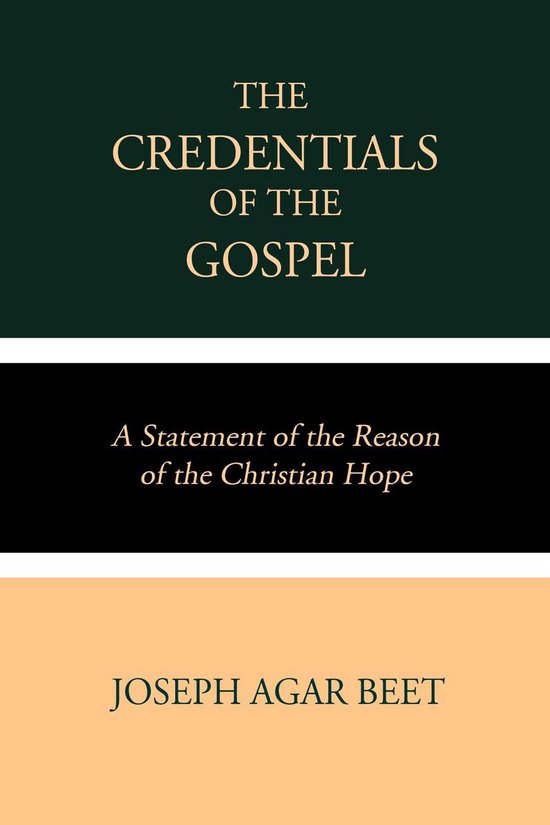
| Taal: | en |
| Bindwijze: | E-book |
| Oorspronkelijke releasedatum: | 25 juni 2019 |
| Ebook Formaat: | Adobe ePub |
| Illustraties: | Nee |
| Hoofdauteur: | Joseph Agar Beet |
| Hoofduitgeverij: | Crossreach Publications |
| Lees dit ebook op: | Android (smartphone en tablet) , Kobo e-reader , Desktop (Mac en Windows) , iOS (smartphone en tablet) , Windows (smartphone en tablet) |
| Studieboek: | Nee |
THE following lecture differs somewhat from other statements of the evidences of Christianity by its fuller exposition of the contents of the Gospel of Christ as the matter to be proved. It thus encroaches upon the domain of Systematic Theology. But this encroachment was to me inevitable. For the peculiar contents of the Gospel make needful peculiar attestation. Consequently, according to our conception of the Gospel will be our demand for proof that it is true and our estimate of the validity of such proof.
This exposition of the contents of the Gospel has enabled me to show the bearing of its credentials upon Christian life and especially upon personal assurance of salvation.
I have also endeavoured to distinguish between proof that the Gospel is true, which is the aim of this lecture, and the Authority of Holy Scripture, which is not needful to my argument and with which I have not attempted to deal. This distinction, often overlooked, is of the utmost importance.
My vast obligations to the many writers in this important department of Theology, I can neither acknowledge nor estimate. From them probably has been learnt everything good in this volume. My earliest teachers were Butler and Paley. The famous Analogy is still a valued text-book in the schools of Theology, and an abiding power among the many phases of modern religious thought. And, although later Biblical research and modern modes of attack have made needful other works which have somewhat superseded those of Paley, he will ever hold his place of honour as a great leader in the historical attestation of the Gospel.
Among recent works I may mention as of special value, The Gospel of the Resurrection by Westcott, The Basis of Faith by Conder, The Foundations of Faith by Wace, The Resurrection of our Lord by Milligan, and Christian Evidences viewed in relation to Modern Thought by Row; also by this last writer a very excellent and attractive book of small size and price entitled A Manual of Christian Evidences.
Of the contribution to this subject which I now venture to give, the part most needing further development is the argument for the existence of God. But it seemed to me best, in the small space at my command, to discuss fully only one line of evidence, this being itself sufficient proof that the Gospel is true, referring to others merely as they lead up to this chief argument. A good popular book on the topic so scantily treated by me is the First Principles of Faith by Marshall Randles.
As a very able and attractive, and within its limits complete, exposition of a subject which I have placed at the beginning of my argument, and which must ever be the foundation both of personal religion and of all satisfactory proof that the Gospel is true, I commend very cordially the Fernley Lecture of last year on The Christian Conscience by my colleague W. T. Davison. The brilliant lecture of the preceding year by Dallinger on The Creator and what we may know of the Method of Creation anticipated some of the remarks in my section on the Evidence afforded by the Material World. Other statements in the same section have been anticipated in W. Arthur’s most able lecture on The Physical and Moral Law. Thus it has been my good fortune to build upon a foundation well laid by my predecessors.
Since this lecture was written I have read with much interest a most admirable volume, just published, on Darwinism by Dr. A. R. Wallace, a naturalist of the first rank. With great pleasure I notice that he has, by anticipating it, confirmed, even in its spiritual significance, the main argument of Section iii. of this lecture.
The prominence given to Haeckel, some of whose scientific opinions are already discredited, may seem to be beyond his merits. My chief reason for quoting him is that the theological teaching woven into his works on natural science seems to me to be the necessary logical result of modern scientific Agnosticism. Moreover, Spencer and Haeckel are the two authorities on Biology quoted by Huxley in his article on that subject in the Encyclopædia Britannica. And I do not know of any protest by Agnostics against Haeckel’s theological principles. Teaching practically the same as his has lately been set forth with great confidence in a popular form by Clodd. Haeckel, therefore, seemed to me the best representative of theological opinions prevalent now in certain circles, and in their tendency exceedingly hurtful.
These opinions I have endeavoured to combat, not so much by direct disproof, as by plain statement of the Reason of the Christian Hope.
WESLEYAN COLLEGE, RICHMOND
9th September 1889.
CrossReach Publications